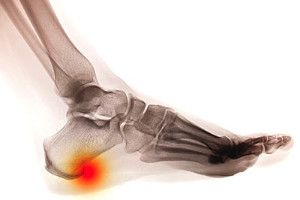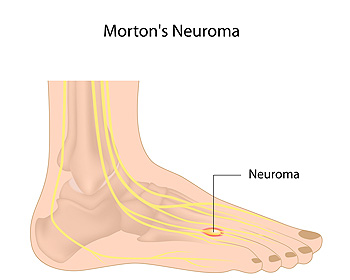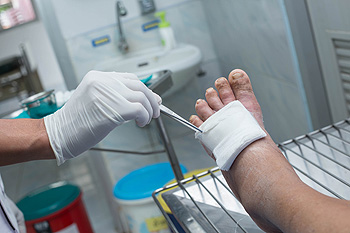 When the nerves are damaged in the extremities such as the feet, it is known as peripheral neuropathy. This ultimately leads to Charcot foot when the bones in the foot are weakened. These weakened bones can lead to fractures that worsen and cause the joints in the foot to collapse. Charcot foot can cause the foot to become deformed, and it can be disabling and even potentially lead to amputation. Common signs of Charcot foot are a warmness to the touch, redness, swelling, and pain. Because of its association to neuropathy and neuropathy’s association with diabetes, diabetic patients should monitor their feet for this condition. Patients who believe that they may have this condition should consult with a podiatrist as soon as possible. A podiatrist will be able to assess the foot and suggest treatment options.
When the nerves are damaged in the extremities such as the feet, it is known as peripheral neuropathy. This ultimately leads to Charcot foot when the bones in the foot are weakened. These weakened bones can lead to fractures that worsen and cause the joints in the foot to collapse. Charcot foot can cause the foot to become deformed, and it can be disabling and even potentially lead to amputation. Common signs of Charcot foot are a warmness to the touch, redness, swelling, and pain. Because of its association to neuropathy and neuropathy’s association with diabetes, diabetic patients should monitor their feet for this condition. Patients who believe that they may have this condition should consult with a podiatrist as soon as possible. A podiatrist will be able to assess the foot and suggest treatment options.
Neuropathy
Neuropathy can be a potentially serious condition, especially if it is left undiagnosed. If you have any concerns that you may be experiencing nerve loss in your feet, consult with one of our podiatrists from Foot Health Center of Merrimack Valley. Our doctors will assess your condition and provide you with quality foot and ankle treatment for neuropathy.
What Is Neuropathy?
Neuropathy is a condition that leads to damage to the nerves in the body. Peripheral neuropathy, or neuropathy that affects your peripheral nervous system, usually occurs in the feet. Neuropathy can be triggered by a number of different causes. Such causes include diabetes, infections, cancers, disorders, and toxic substances.
Symptoms of Neuropathy Include:
- Numbness
- Sensation loss
- Prickling and tingling sensations
- Throbbing, freezing, burning pains
- Muscle weakness
Those with diabetes are at serious risk due to being unable to feel an ulcer on their feet. Diabetics usually also suffer from poor blood circulation. This can lead to the wound not healing, infections occurring, and the limb may have to be amputated.
Treatment
To treat neuropathy in the foot, podiatrists will first diagnose the cause of the neuropathy. Figuring out the underlying cause of the neuropathy will allow the podiatrist to prescribe the best treatment, whether it be caused by diabetes, toxic substance exposure, infection, etc. If the nerve has not died, then it’s possible that sensation may be able to return to the foot.
Pain medication may be issued for pain. Electrical nerve stimulation can be used to stimulate nerves. If the neuropathy is caused from pressure on the nerves, then surgery may be necessary.
If you have any questions, please feel free to contact one of our offices located in North Andover, and Tewksbury, MA . We offer the newest diagnostic and treatment technologies for all your foot care needs.


 Heel spurs
Heel spurs







